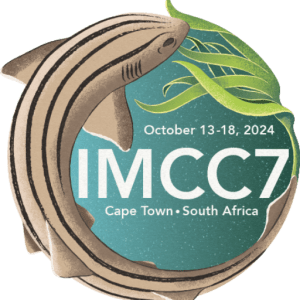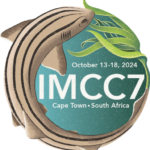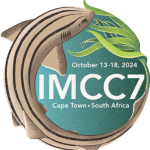Presenter Information
INFORMATION FOR PRESENTERS
Please refer to the information below for questions on how to format your presentations at IMCC7, including technical specifications, and for information on abstract type formats.
ABSTRACT FORMAT
Abstracts must be submitted electronically; web submission is the only format for submission*. All abstracts are limited to 250 words. Please note that the submission system will cut off your abstract if you copy/paste, so please confirm that your abstract fits before submitting.
*Please visit the Accessibility page if you need the submission form in a different format for accessibility reasons.
SESSION FORMATS
SYMPOSIA SESSIONS
Symposia address critical or cutting-edge marine conservation topics proposed by a facilitator. Symposia talks will be 10 to 12 minutes with time reserved at the end for discussion. Symposia organizers must submit a symposium abstract explaining the topic of the symposia and list the expected contributors. Presenters of accepted symposia will be required to submit an individual abstract after the acceptance of the symposium during the regular call for abstracts. A symposium ID will be provided to organizers in the acceptance letter and this ID must also be included in the individual abstract submission to ensure placement in the appropriate symposium. All symposium organizers and speakers must register by the early registration, TBD 2024.
WORKSHOP SESSIONS
Workshops provide opportunities for registered delegates to receive expert training on a topic relevant to marine conservation. Proposals for short courses should be as brief as possible and submitted in abstract format, including a description of what the workshop will address, the expected outcomes, and how it will be run. If the workshop is selected, then we will ask for further organizational details. Workshops are pre-congress events; post-congress events may be considered but are not preferred as they would directly compete with field trips. Workshops may last up to 2 days from the 13-15 October 2024. All workshop organizers, tutors, and speakers must be registered for the congress as early bird registrants. There will be a fee for short courses that each participant will pay in addition to the congress registration fee. Course fees will be determined according to the cost of room rentals, catering, and equipment required. The organizers reserve the right to cancel courses up to one month before the congress is the course does not have sufficient participants registered to cover the costs. There is no economic support or compensation from IMCC7 for the organizers of training courses.
FOCUS GROUP SESSIONS
Focus Groups bring together people with diverse expertise to develop tangible and actionable outputs — such as a list of recommendations, a publication, a policy briefing or a white paper — on a specific marine conservation issue. Focus groups can be held over the course of two days, for a duration between 2 and 8 hours. To minimize conflict with symposia and contributed paper sessions, focus groups of greater than two hours (max. eight hours) will be scheduled before or after the main scientific program. Focus groups of two hours in duration will generally be scheduled during the main scientific program. Focus groups typically have a smaller number of participants (10-30 maximum). Pre-meeting and post-meeting focus groups will require a separate fee for participants in addition to the congress registration fee to offset the additional costs of running the focus group. Any special needs or equipment might incur additional costs. Proposals for focus groups should be submitted in abstract format and include the following: (1) a synopsis composed of the goal or purpose, justification and outcome for the focus group (2) organizational structure including duration, format, expected number of participants, and technical requirements. Please contact the IMCC Program Committee with any questions.
ORAL PRESENTATION FORMATS
ORAL (SPOKEN) PRESENTATIONS
Oral presentations will be limited to 15 minutes: 12 minutes for presentation and 3 minutes for questions. Oral presentations will be grouped by topic; please choose from the list of general topic areas when you submit your abstract. If your abstract is accepted but cannot be accommodated as an oral presentation, we may offer you the opportunity to present a speed talk or poster. All oral presentation rooms will be equipped with a computer and a data projector. Detailed information and instructions on presentations at the congress is available below.
SPEED (SHORT SPOKEN) PRESENTATIONS
If your topic is of interest to a wide range of people and you would like your presentation to lead to an extended conversation with colleagues, you may wish to submit an abstract for a speed presentation. Speed presenters have 4 minutes to present their key ideas and results. This time limit will be strictly enforced. If your abstract is accepted but cannot be accommodated as a speed presentation, we may offer you the opportunity to present a poster.
ORAL PRESENTATION INSTRUCTIONS
Specifications for PowerPoint Presentations: TBD
Presentations Using Keynote / Macs
The congress is equipped for presentations made on PCs using PPT.
IMCC7 will not be using mac software on site, and as a result we will not be able to support Keynote presentations on-site. We encourage presenters using Keynote software to convert their presentation to PPT format before the congress to limit the risk of technical issues and wasted time at the beginning of your presentation. If the presenter unable to convert their keynote presentation to PPT format, the presenter should bring their Mac we will provide assistance in converting the file. If you require this assistance, please ask for it as early as possible.
Video and Pictures in Presentations
For presentations with videos or photos, presenters should use the video and photo integration format built into PowerPoint in order to create a seamless presentation with minimal delays. Please keep a copy of all photos and videos used in your presentation in a folder with the presentation to reduce the risk that the presentation is unable to fetch the photo or video data. For videos, we encourage formats such as .MP4, .MOV, .AVI, and .WMA with 720p or 1080p resolution. For pictures, please save them in .jpg or .png format.
How to Upload Your Presentation: TBD
POSTER PRESENTATIONS
Posters are a visual, concise way to showcase research and projects, exhibited for informal browsing. They provide presenters the opportunity to interact with their audience. Text should be limited to brief statements. Each poster should make a unified, coherent explanation of your work. Materials, both textual and visual, should be of professional quality and clearly legible from a distance. Good tips for your poster design can be found HERE (http://colinpurrington.com/tips/poster-design).
Your poster must be limited to 114cm x 114cm (45in x 45in) in order to fit on the poster board. Posters will be assigned a number that will correspond to the appropriate board.
The preferred method of creating a poster is using design or presentation software such as Microsoft PowerPoint or Adobe Pagemaker. These programs allow you to lay out the entire poster, including text and graphics, in a single file. It can then be printed using a large, color printer. (Please note that all posters must be printed and paid for by the presenter; we will not print posters for you. An option for convenient printing in Kuching is described below.)
There will be a dedicated poster session and reception on TBD From TBD in the TBD. Presenting authors must remain at their poster during the session.
POSTER PRESENTATION INSTRUCTIONS
How To Submit your Poster via Email Before the Congress: TBD
How To Print your Poster: TBD
MODERATORS (CONTRIBUTED & SPEED SESSIONS)
GENERAL INFORMATION
- All contributed session speakers have 15 minutes (12 minutes for presentation, 2-3 minutes for Q&A) & all speed session speakers have 5 minutes (4 minutes for presentation, 1 minute for Q&A).
- All sessions are scheduled in South African Standard Time (SAST)
- Contributed & Speed Sessions are not recorded; however, virtual presenter recordings (for hybrid sessions TBD) will be available on demand after the session and in-person presenters have been encouraged to upload a recording of their presentations, which will also be available on demand after the session, or once uploaded.
- In case of major AV failure, please call the number provided on your printed session list to reach the audio visual tech on-duty directly. They will then send an AV technician to that room.
DAY OF INSTRUCTIONS
- Arrive 10-15 minutes before the session starts. Please bring your own watch or clock (or use your phone) Check that all speakers are present before start of the session. Consult speakers about any questions regarding pronunciation of names. Speakers are in bold on schedules (printed list will be in the session room).
- Make sure all equipment is working properly. If any equipment is not working properly, report it to an AV technician, or volunteer. Each room should contain:
- Laptop
- LCD projector and screen
- Podium with microphone
- Check the lights and projection, adjust as needed. Try to have dim lighting in the back of the room that can be left on during the presentation. This aids note-taking and safe movement of people in and out of the room during talks.
- The presenters’ PowerPoint presentations should be pre-loaded onto the computer in the room. Familiarize yourself with how to select pre-loaded PowerPoint presentations, how to begin a presentation, etc. Instructions are on the computer.
- Brief each presenter on how the session will be conducted, including when and how time warnings will be communicated. g., use a visual (time cards) or vocal signal when there are 3 minutes remaining, stand-up when there is one minute remaining, and walk to the podium and politely indicate that their allotted time has come to an end. Encourage speakers to leave a few minutes for questions at the end of their talk.
- Remind presenters they must speak into the microphone.
- Start on time! even if it appears that not all speakers have arrived. This is extremely important to ensure each presenter has their allotted time and has time for questions and answers.
- If unsure ask presenters how to pronounce their names and Introduce all presenters in the order listed in the program. Be sure to mention each presenter’s name, affiliation and presentation title.
- Announce any canceled talks. You can use the time from a canceled talk for questions but do NOT move the program forward when a presentation is canceled. Keep track of all canceled talks on the paper list provided to you in the room and give it to a volunteer at the end of the session/leave it in the room.
- During the Q&A period, presenters/moderators should always repeat the question for the audience. Try to have at least one question ready for each talk in case there is time for questions and none arise from the audience.
- End the session on time. Close the session by thanking the presenters.
ADDITIONAL INFO FOR SPEED TALK SESSION MODERATORS
- Sessions are grouped according to topic and will consist of a subgroup of ~3-5 presentations (4-minute talk, 1 minute QA), with a 15-minute break for Q&A for all speakers in the subgroup. The session moderator will then introduce/facilitate the next subgroup and group Q&A.
- The brevity of speed presentations creates a culture of tight timing that affects the moderation of the session too. For example, time can be saved if the speakers introduce themselves while the volunteer opens the next computer file. Transition time can also be minimized if all the speakers are asked to sit in the front row in the sequence in which they will speak.
- Give presenters a clear signal when they have 30 seconds left; stand up when they have 10 seconds left so that you are ready to displace them from the podium when their time is over.
- If the full 15-minute discussion time is not used, do not advance to the next subgroup. Pause until the scheduled start of the next talk series.
The 7th International Marine Conservation Congress
OCTOBER 13-18, 2024
CAPE TOWN, SOUTH AFRICA



